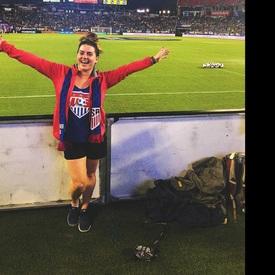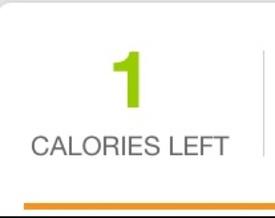Food tracking...what do you track?
Replies
-
Since I am on a Primal diet I track the following
Carbs (20%)
Fat (50%)
Protein (30%)
Fiber
Sodium
I used to track sugars...but not anymore. As long as I stay within the confines of Primal..I dont need to worry about sugar. I also listed what my macros are at....0 -
I track calories, fat, protein, carbs, and sodium.
I used to track sugar, but i have never been under sugar one day--ever--and I've been here for almost a year. I hated seeing the red numbers, even when I tried to cut back on sugar. I eat a lot of fruit and it counts the sugars in fruit which would cause my numbers to go over.
SO i just don't track sugar anymore (though I am conscious of not eating junk food).0 -
I track Carbs, Protein, Fat, Fibre, Sodium at the moment, but I vary the last two as and when I have "mastered" getting a full daily quota regularly.
I never used to eat enough fibre so I made a point to track it. After a few weeks I now know how to get enough easily, and so I'll change it to something else I need to master, eg I think Vit C is next.
I'll then move onto something else when I feel happy I'm hitting my targets. 0
0 -
i track iron and calcium since i tend to run low in those two areas. i track salt since i have a salt senstivity and can not consume a lot. then i track fiber and sugar.0
-
I mainly focus on calories and protein.0
-
I mainly focus on calories and fat, carbs, and soduim...0
-
I track everything I eat drink and exercise!xgx0
-
I make sure I limit calories and that I get enough protein and potassium. I'm taking Tums, a multivitamin, a B complex with C, and occasional additional vitamin D (I've got osteoporosis), so I'm generally ok for calcium and vitamins. It's hard to track potassium, since most foods don't include it. If I eat something a lot, I'll look it up on the USDA database and edit the MFP database. But mostly I have to be satisfied having more potassium than sodium.
I don't worry about fat, which is usually extremely low for me anyway. I don't worry about sugar, as most of my calories are carbs by default.
I try to track vitamin K on my own, as that isn't listed on food labels and the amount in multivitamins is less than half the RDA.0 -
For me it's calories, obviously, but one that I'm finding super useful is calcium. A week of tracking has shown me that my calcium intake is woefully inadequate. I think all women should take note of their calcium consumption so they can adjust their diet/supplement as needed.0
-
Other than fats, carbs, and protein, I track my sodium because I have a tendency to go over, and I track my calcium, because I don't always get enough, and I NEED to get enough because I'm breastfeeding and it totally saps all my calcium!0
-
I make sure I limit calories and that I get enough protein and potassium. I'm taking Tums, a multivitamin, a B complex with C, and occasional additional vitamin D (I've got osteoporosis), so I'm generally ok for calcium and vitamins. It's hard to track potassium, since most foods don't include it. If I eat something a lot, I'll look it up on the USDA database and edit the MFP database. But mostly I have to be satisfied having more potassium than sodium.
I don't worry about fat, which is usually extremely low for me anyway. I don't worry about sugar, as most of my calories are carbs by default.
I try to track vitamin K on my own, as that isn't listed on food labels and the amount in multivitamins is less than half the RDA.
You realize that without fat your body will not absorb the Vitamin D right? Anyone that needs to take a Vitamin D supplement should be consuming a bit higher fat eating plan so that the Fat soluable vitamins will get absorbed.0 -
The app I use to track calories also tracks carbs protein and fat. I like my app because it has a range for each of these, not just one number to meet. Calories in/ calories out is the golden rule, bit I've always felt I've had more success when my macros are met and balanced.0
-
Calories and protein are my main concerns (not too many calories, plenty of protein) - I only casually watch carbs and fat, they are not a deal-breaker in my meal planning. LOL I don't bother watching sugar or sodium, that would just depress me. My 'extras' are fiber and calcium, just to be sure I'm getting enough on a daily basis.0
-
You realize that without fat your body will not absorb the Vitamin D right? Anyone that needs to take a Vitamin D supplement should be consuming a bit higher fat eating plan so that the Fat soluable vitamins will get absorbed.
Good point, but my bone density jumped considerably on the current plan, so it appears to be working out. I usually take my multivitamin with my fattiest meal of the day.0 -
I track carbs ( try to keep low), fat, protein, fiber (try to keep high), and sugar( because I have a major belly fat problem).0
-
I track every food I put into my mouth. But the main focus for me is fat, carbs, calories, protein, and sugar. Sugar for me is the devil so I do my best to keep it as low as possible and certainly avoid going over if I can help it.0
-
Here are my main things I track:
Calories
Sugar
Fiber
Protein
Sodium
The importance I place of hitting the goals are in the following order: Calories, Fiber, Sodium, Protein, Sugar. I find it frustrating to stay within my sugar limit because I eat fruit a lot and that seems to up it pretty quick. It would be different if I ate sweets but I very rarely do 0
0 -
Protein mainly. Beyond that I just try and hit my calorie goal for the day.0
-
I make sure I limit calories and that I get enough protein and potassium. I'm taking Tums, a multivitamin, a B complex with C, and occasional additional vitamin D (I've got osteoporosis), so I'm generally ok for calcium and vitamins. It's hard to track potassium, since most foods don't include it. If I eat something a lot, I'll look it up on the USDA database and edit the MFP database. But mostly I have to be satisfied having more potassium than sodium.
I don't worry about fat, which is usually extremely low for me anyway. I don't worry about sugar, as most of my calories are carbs by default.
I try to track vitamin K on my own, as that isn't listed on food labels and the amount in multivitamins is less than half the RDA.
You realize that without fat your body will not absorb the Vitamin D right? Anyone that needs to take a Vitamin D supplement should be consuming a bit higher fat eating plan so that the Fat soluable vitamins will get absorbed.
Hey, that's awesome! I didn't realize that at all. (And of course my doctor never mentioned it.) I am severely Vitamin D deficient. Now I can say that my high daily fat count is actually *good* for my health. :-D0 -
You realize that without fat your body will not absorb the Vitamin D right? Anyone that needs to take a Vitamin D supplement should be consuming a bit higher fat eating plan so that the Fat soluable vitamins will get absorbed.
Good point, but my bone density jumped considerably on the current plan, so it appears to be working out. I usually take my multivitamin with my fattiest meal of the day.
I'm actually doing my doctoral independent study on osteoporosis. High impact exercise and weight bearing exercise has been shown to increase bone mineral density! Avoid any flexion as this puts the most stress on your spine! Lying on your back several times a day (if thats even possible!!) decompresses your spine and gives it a "break" so to speak. Just thought i'd throw that in there 0
0 -
Thanks everyone for your input!0
-
What are the most important things to track? They give you so many options, but which ones are the most important to stay within a certain range?
i track everything i eat and i add my water in there so then u no exactly whats going in ur body ...... good luck0
This discussion has been closed.
Categories
- All Categories
- 1.4M Health, Wellness and Goals
- 393.4K Introduce Yourself
- 43.8K Getting Started
- 260.2K Health and Weight Loss
- 175.9K Food and Nutrition
- 47.4K Recipes
- 232.5K Fitness and Exercise
- 426 Sleep, Mindfulness and Overall Wellness
- 6.5K Goal: Maintaining Weight
- 8.5K Goal: Gaining Weight and Body Building
- 153K Motivation and Support
- 8K Challenges
- 1.3K Debate Club
- 96.3K Chit-Chat
- 2.5K Fun and Games
- 3.7K MyFitnessPal Information
- 24 News and Announcements
- 1.1K Feature Suggestions and Ideas
- 2.6K MyFitnessPal Tech Support Questions















